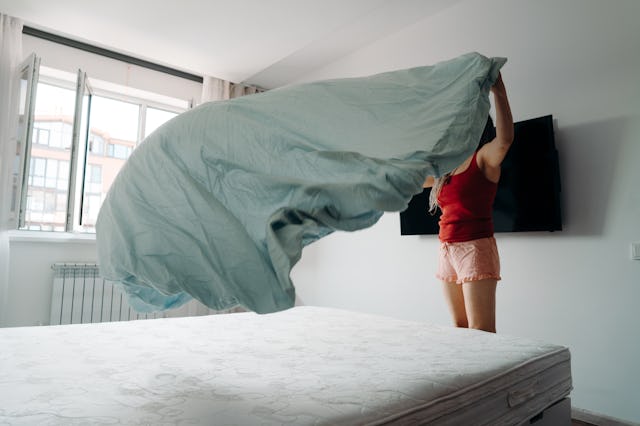How Do You Clean A Mattress? Because, Yup, This Is A Thing We Should All Be Doing
This chore isn’t quite as annoying as folding fitted sheets... but it’s up there.

You already know how often to wash your bed linens. You probably even know how to strip your pillows. You have a strict laundry practice. And you've managed to streamline how you clean your house. But, if you've left cleaning your mattress off any of those linen-conditioning, home-tidying-to-do checklists, you're royally screwing yourself over.
Most of us have streamlined how we clean our house out of necessity. Life is busy and chaotic — who has any extra time (than it already takes) for household chores? So, you have a semi-regular schedule for washing your bed linens and even stripping your pillows. But if you've left cleaning your mattress off any of those linen-conditioning, home-tidying-to-do checklists in the name of saving a few minutes, you may be screwing future-you over.
Yup, your mattress needs to be cleaned, too.
Before you say anything, you're right: Everything about mattresses is cumbersome, from the price you pay to the effort it takes to change their sheets. Since they're also kind of a modern necessity, though, taking proper care of them is the best way to ensure you don't have to deal with buying another one any time soon. Plus, since your mattress affects the quality of your sleep, and the quality of your sleep affects your health, it makes sense to treat your mattress like the important possession it is.
Here's another way to look at it: If you don't clean your mattress, it basically becomes a big ol' accumulation of dead skin, dirt, dust mites, and other things you don't really want to think about bunking on every night.
How often should you clean your mattress?
According to The Sleep Foundation, you should clean your mattress at least once every six months. However, if the bed belongs to a particularly leaky human (read: kids who have accidents at night), it should be washed every time it's peed on. Similarly, you'll want to at least spot clean anytime you spill something before the stain has time to set.
Investing in a quality mattress protector is an easy way to minimize the need to clean your entire mattress — when the protector gets dirty, you can pop it in the wash.
How do you spot clean a mattress?
Did you have a spill on your mattress before you could save up for that mattress protector? No worries! A little spot clean might do the trick.
According to BedGuru, it's pretty easy to spot clean a (fresh) stain off your mattress:
- Mix a 50/50 solution of (white) vinegar and water in a spray bottle.
- Spray the stain.
- Blot with a clean rag.
- Repeat the spraying and blotting process until you've removed all signs of the stain.
- Sprinkle with baking soda and let sit for about an hour.
- Vacuum up the baking soda.
- Let your mattress air dry.
This is the best course of action for stains from bodily functions. If you've spilled something like wine (*bow chicka bow wow*) or another liquid, consider looking up a laundry stain cheat sheet and using that same method on your mattress.
How do you deep clean a mattress?
Even if you're meticulous about what goes into bed with you and you're not having any accidents, maintenance cleaning your mattress is still essential. After all, we're sweaty, leaky, disgusting beings when we sleep. For best results, do this on a bright, sunny day with your curtains open so you can see any issues on your mattress. And since it'll take time for your mattress to dry after cleaning, it's best to start in the morning.
Follow these steps to keep your mattress looking, feeling, and smelling fresh.
Forgotten first step: Wash your bedding.
While your bedding isn't part of your mattress, it has to go on your mattress — and bedding can get pretty gross and grimy (even if it doesn't look it). Use the laundry care instructions that came with your linens, but remember that hotter water is better when it comes to killing germs.
Vacuum your mattress.
No, seriously. If you have a hose and upholstery attachment for your vacuum, that will work best, but rolling a full-sized upright vacuum across your mattress won't hurt it. It's lighter than you, right?
Steam it.
If you don't have a steam cleaner, steaming with an iron will work in a pinch. The hot air will kill dust mites and help remove any musty smells. Follow up by vacuuming again.
Spot clean.
Use the method discussed above to clean any lingering stains on your mattress. You could also use a carpet cleaning bottle with the scrub brush or pet stain removal tools, like Bissell's Little Green Proheat Portable Cleaner.
Deodorize it.
This time, don't limit your baking soda use to stains or wet areas. Sprinkle it on the entire mattress, let it set for at least an hour, and then vacuum it up.
Air it out.
After you've swept, scrubbed, steamed, and swept again, your mattress needs time to dry. To help facilitate drying, leave the sheets off, a fan on, and the sun pouring in.
How often should you replace your mattresses?
Do you feel like nothing you do helps your mattress look or smell fresh? Wake up with a crick in your neck and a back that feels like you spent all day standing? It might be time to flip or rotate that baby. Or it might just be time for another.
In the past, we slept on the same mattress for decades. However, new research (and new mattress-building procedures) says that's a no-no. The Sleep Foundation suggests that most mattresses should be replaced every six to eight years.